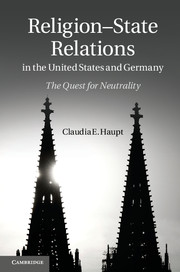Book contents
- Frontmatter
- Contents
- Acknowledgments
- Introduction
- Part I The Comparative Approach
- 1 The past and present of comparative constitutional studies
- 2 The culture wars, American exceptionalism, and a comparative analysis of religion–state relations
- 3 Employing a comparative approach
- Part II Religion–State Relations and the Role of Neutrality
- Index
- References
1 - The past and present of comparative constitutional studies
from Part I - The Comparative Approach
Published online by Cambridge University Press: 05 January 2012
- Frontmatter
- Contents
- Acknowledgments
- Introduction
- Part I The Comparative Approach
- 1 The past and present of comparative constitutional studies
- 2 The culture wars, American exceptionalism, and a comparative analysis of religion–state relations
- 3 Employing a comparative approach
- Part II Religion–State Relations and the Role of Neutrality
- Index
- References
Summary
The comparative study of neutrality in religion–state relations that follows does not take place in an intellectual vacuum. In addition to the rich literature on comparative law generally, there is an ever-growing body of literature on comparative constitutional law. In the United States, comparative constitutional law has lately become both an emerging field of study and a controversial notion. A quite remarkable debate has developed over the last decade on the proper role – if any – of comparative constitutional law. That debate forms the background for this inquiry.
The disagreement over a comparative approach to constitutional interpretation and study is perhaps one of the most prominent debates in contemporary US constitutional law discourse. All relevant groups of actors, including academics and judges as well as politicians, are engaged in the debate that is taking place in the scholarly literature, in opinions of the United States Supreme Court, in legislative debates in Congress, and in the media. The underlying questions touch on the core understanding of what constitutions are and how they should be interpreted. This chapter is a primarily descriptive account of that debate; the goal is not to recap the entire debate, but to address a few particularly important issues.
- Type
- Chapter
- Information
- Religion-State Relations in the United States and GermanyThe Quest for Neutrality, pp. 11 - 39Publisher: Cambridge University PressPrint publication year: 2011



